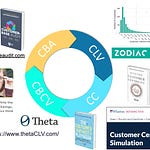My guest today is Geoff Henshaw, former CMO of Stoko. This is part 1 of the interview where we explore his career at Shoes.com, 1-800-Got-JUNK, and more. Tomorrow we look at the Stoko business and how he is creating a new category of “everyday injury prevention wear”. Geoff is currently looking for his next CMO opportunity. Feel free to reach out to me if interested and I can put you in touch.
Transcript
Edward: My guest today is Geoff Henshaw. Today we cover Geoff's career and path to be the Chief Marketing Officer. UBC, Coastal Contacts, Shoes.com, 1-800-GOT-JUNK? Geoff now oversees all of the revenue for Stoko. Stoko was founded in 2017 and manufactures athletic wear with built-in orthopedic knee braces. I'm excited to have you here today, Geoff.
Geoff: Thanks for having me.
Edward: Geoff, in 2016 you oversaw brand and retail marketing for Shoes.com and then you were promoted to running all of marketing. How did you get that promotion? How did they move you from running part of marketing to running the whole show?
Geoff: The Chief Marketing Officer was no longer with the company, and I was familiar with the marketing functions that were driving revenue for Shoes.com, so I had the opportunity to move into the role.
Edward: What skills were you missing? You've never run all of the marketing before, now you were. What were your gaps?
Geoff: I think Shoes.com is obviously competing in a very competitive space, which is shoe online retailers so competing with Amazon and Zappos. The area that I was missing was (I would say) the hard marketing skills. I just hadn't necessarily practiced as much as I’d like to. That would also be on the performance marketing side. While I was there, I had the opportunity to really learn from a guy, Brad Wilson, everything there was to know about controlling unit economics, understanding the impact of pricing, and how to think about your overall marketing mix.
Edward: When you got there and you had to pick up those skills, why did they trust you to take on that role? Because performance marketing is usually one of those—it's not the most important, but it's the most obvious and the fastest feedback cycle on all of the marketing functions. To put you in that role without that, was there a risk? Why take the risk on you, just because they knew you well?
Geoff: Yeah, I think definitely a part of it was that I was a known entity. Roger Hardy oversaw clearly where I was at previously and then oversaw Shoes.com. Having that relationship certainly helped. I think I was also very clear on the things that I didn't know and had also assembled a team of strong operators around me who can certainly step into those functions where I can lead and manage them from starting at objectives and strategy. Then leaving and leaning on them for the tactical execution.
Edward: I want to go back and talk about your path to getting there. Your first role out of business school was at the General Manager position. Many people aspire for the GM role, but you just started there right out of school. How does a newly minted CMO get a country manager role?
Geoff: It was an interesting role in that it never existed before and the country manager role for Canada, for Coastal Contacts at that time, that was the country they were generating the most revenue so it's an important role. I think the areas where I was able to land that role and then enjoy and perform well on it were getting clear on the objectives, the strategy, ensuring that all the key stakeholders were supportive, and then getting after it, which I think everyone really appreciated. It's something that I've leaned on that formula for my entire career.
Edward: How do you get started in that role? If I’m a new MBA coming out of school, did you go out and look for GM roles where you can jump into a GM role right away, or was it a coincidence? How did you find that?
Geoff: It was kind of a coincidence. I was in Vancouver, Canada and I completed my MBA at the University of British Columbia. At that time, I was interested in Management Consulting or working for an ecommerce startup. Management Consulting basically in Canada is limited to Toronto. I wasn't interested in commuting to Toronto or living there again.
I found that I was very focused on local opportunities, and just through the MBA program, I was referred to this open role that was available with [...]. I just did my homework and came with the focus and energy that they were looking for, and they decided to take a risk on me.
Edward: Were they planning to hire a newly minted MBA for that job, or did you impress them with your skills and they took somebody with less experience than they were hoping for?
Geoff: Yeah. They had a culture of hiring MBAs. There were a lot of MBAs on the marketing and the leadership team. They were willing to roll the dice on me.
Edward: Talk a little bit about what you did in those roles over at Coastal Contacts, especially around customer acquisition.
Geoff: The main thing I did was look to get a deep understanding of not only the target customer but who the most profitable customer was. With that disability into that customer, it becomes a bit of—I would describe it as—a rallying tool for an organization where you can build out things like personas. You can talk about net promoter score, and you can ground organizations and team’s activities into the experience of the customer.
With the Canadian market and then with what we call the Commonwealth market of Australia, New Zealand, and the UK, it kind of focused on the customer, our value proposition, where the organization was properly positioned to drive that value proposition, and then rallied teams, activities, and behaviors around driving and stimulating a great customer experience of driving that top-line revenue.
Edward: You also gave away a lot of free products.
Geoff: Yeah, and it was a really interesting insight, which—full credits to the team—started before I got there. Their insight was clearly, at that time, had a net promoter score north of 80 if I recall, which was far and above the industry average for net promoter score. Based on that insight, we were able to say, hey look, we're delivering this incredible experience to people, and our product cost is actually quite low.
In fact, our product cost is below what our acquisition cost is. We also anticipate that there's going to be a huge opportunity for recurring revenue. People have insurance benefits that they can rely on to purchase new prescription eyeglasses one time per year or once every two years. There's a great opportunity for recurring revenue with glasses, contact lenses, and sunglasses.
What we decided to do, in a limited way, is starting to roll out testing around the first pair free. Again, the hypothesis is if you deliver this incredible experience where people get their first pair of eyeglasses for free, you're essentially removing all barriers. There's a good chance that they're going to come back again for more prescription eyeglasses or contact lenses and even better, they're going to tell their family and friends about it.
Edward: Let's jump ahead to when you left Shoes.com and you joined O2E Brands. O2E is best known for those big trucks plastered with 1-800-GOT-JUNK? After spending a lot of your career to that point in ecommerce, how do you go about learning a service business like that?
Geoff: Great question. I think O2E, Ordinary to Exceptional brands—the focus on home service verticals and their franchise. They are on the opposite end of the spectrum from our Shoes.com. It's super fragmented, Geoff’s truck service can startup a business tomorrow and be driving around and digitally advertising.
The things that I focused on were the customer, how to think about the customer, and how to get insights on the most profitable customer and connect the marketing function. That means the structure of the team, KPIs, to understanding the customer. I think my admission at O2E when I started was essentially to modernize the marketing function at the organization.
Edward: How do you get to know those customers in a real visceral way?
Geoff: I think there's a number of different tools, but generally, the way I think about it is if you can align with your internal stakeholders on who that most profitable customer is, that's step one. The second part is if you can spend some time getting to know that customer, that's important. Part of my onboarding at O2E and working on the 1-800-GOT-JUNK? business specifically was I spent a ton of time in major cities across North America just actually driving around on the trucks.
I was one of the guys, in full uniform, and we were going out and doing jobs for customers. From there, I was able to understand day-to-day on the job what it felt like to be on the truck, understand the experience that we deliver to our customers. One of the things that became clear was that people generally were getting specific jobs done.
For example, they were moving out of their home and they required our services, or they were moving into a home and they required our services. What was interesting there, Edward, is that activity throws off a digital signal. That's a life event that's captured within Google audiences.
From that basic insight, we were able to target groups of people that were moving and we were able to target them with our message and then design customer journeys that were super relevant to people moving. That allowed us to drive that top length growth and a great customer experience.
Edward: One of my favorite quotes from Jeff Bezos is about how when data and anecdotes disagree, the anecdotes are often right and you're doing something measuring it wrong. Did you find that at all? When you were doing this customer research, you're doing all the analytical parts, but then you also went on the road and visited and met the customers. Did you find those anecdotes and data disagreeing, or did they usually just come together and they supported each other?
Geoff: That's a great question. I think the thing that getting out there, observing, and being with customers helped me understand and helped us make some adjustments specifically to the 1-800-GOT- JUNK? value proposition. That people aren't out there shopping for junk service. You might be shopping for shoes or for skis and you might visit a number of different sites. But generally, for junk removal services, you’ve got a specific job to do. That insight in itself allowed us to understand there's a handful of things that generally people need.
For example, they're moving in, they're moving out, they might be renovating, or there might have been something dramatic that happened like a death in the family. Oftentimes, those activities, again, you can target them digitally, which is really exciting. But the thing that changed for us is that we understood that generally, the person that's looking for that service is high intent versus before, we might have viewed it as simply someone is coming across our service and were top of mind and that's why they're selecting us. No, actually, someone’s having an event happen in their life.
Edward: Geoff, what were some of the biggest failure points in your career? Where did things not go as expected?
Geoff: That's a big question. That made me pause. I think there are a few things. One thing was at Shoes.com, that was a job and a role that I had returned back from Sydney, Australia. I moved back for that role. When I joined the organization, it was tough. We were competing in a very competitive category. Ultimately, Shoes.com went through a period of heavy financial distress and was ultimately acquired by Walmart. But through that period of financial distress, we needed to lay off people—people that I really cared about and it was pretty emotional. I felt like I had failed them to a degree and it was just disappointing because many of them I consider friends and I’m still friends with today. That was probably the hardest part for me and my family.
I think the second part is just dealing with [...] interesting because I know you’ve got a concept that things happen to you between when you're 10 and 12 and that's really impactful. I think it's still how you deal with conflict. It's still something I continue to work on to this day and just making sure that things like getting exercise, sleep, staying hydrated, and keeping your energy up to the day, are all important factors so that when those times of conflict come up during the day, and they can come up (in my opinion) very unpredictably, you're able to deal with them in the right way.
Edward: I once had a VP at Amazon explain to me in the early days how close they came to going bankrupt. What he explained to me was when you're taking off in an airplane, if you've never had that experience of the airplane brushing the top of the forests, then you never get the intensity you need to go make the plane take off and fly. It sounds like you had that experience at Shoes.com. Unfortunately, it sounds like you hit some of those trees in the way you go, but did that experience catalyze you for later on in your career? Do you think you would have the career you had if that hadn't happened if Shoes.com had been a lot more smooth?
Geoff: It's a great question. The analogy that I probably use is going a day skiing and not falling. When I go skiing with my kids, if they don't fall it's like, were you actually trying as hard as you could? I can confirm that we tried as hard as we could. We did a lot of things wrong and a lot of things right. I think what I learned is going through that experience was really hard, but I think the things I took away from it are (to your point) I will hold on to those for the rest of my career.
You can definitely start to identify those signals that are warning signals much more quickly. You can act in a way that you know you need to act because oftentimes, they are urgent and you need to react to them quickly and you know those are the right signals to be acting upon. My next stop was O2E Brands. I was able to apply a lot of what I had learned at Shoes.com. Over the course of three years, we closed double the size of that business. That was right when COVID hit, but it was definitely on pace to double, to get to close to $500 million in revenue.
Edward: Geoff, what are your productivity tricks? What do you do to be productive that most people don't do?
Geoff: I think the things for me are building out lists of priorities the night before the next day. My wife absolutely hates it because I'll sit on the bed and just write it down in my master notebook. Here are the top three things for work, here's the top one to three things for family, and then here's the top one to three things for exercise that I want to do the next day. I just find that that allows me to start the next day without having to think through what I need to be doing. I can just start. It also allows me an opportunity to look at a larger list of things and just understand, are there patterns or trends that are merging that don't allow me to get through the things I want to get through.
To give you a quick example, one was I definitely wanted to continue to read as much as I could in the evenings. I found that I wasn't able to reach a particular goal of mine related to reading. The reason why is because I was looking at my phone and I was like, that's just completely useless time. After 9:00 PM, I don't need to be looking at my phone. What that led to me doing was just putting my phone in the closet so I don't look at it anymore and I can spend some time reading.
Edward: When you put those goals, are they only daily goals, or do you have a system for doing them longer than daily?
Geoff: No, I actually had someone, [...] who introduced me to this concept just before I did my MBA. He talked about thinking about your life in 10 years and writing out a rich 4-6 sentence description of what you would love for your life to be like. Then mapping out in 10-, 5-, and 1-year increments anchored to that 10-year vision what would be your goals, and those goals would be connected to your family, your personal life, your own physical wellbeing, and then professional.
Then setting what my three goals are going to be in five years and then setting out what are my three goals going to be for this year. Then three goals in each of those categories—nine goals total. All of those daily goals are anchored to a roughly 10-year plan.
Edward: Do you go back and review that? You've been doing this for ten years, can you go back and look to see what you've done versus the goals you set 10 years ago?
Geoff: Yeah, it is crazy actually. When I first did this exercise, I, for example, set salary goals for myself and my family goals. We didn't have any kids. I wasn't married. I started doing this about 11 years ago and everything came through, which I know they're obviously talked about, but honestly, it was stunning when I looked at it. Just writing those goals down is so powerful.
Edward: Geoff, this has been fantastic. We'll pick this up tomorrow. We'll talk about Stoko.








Share this post